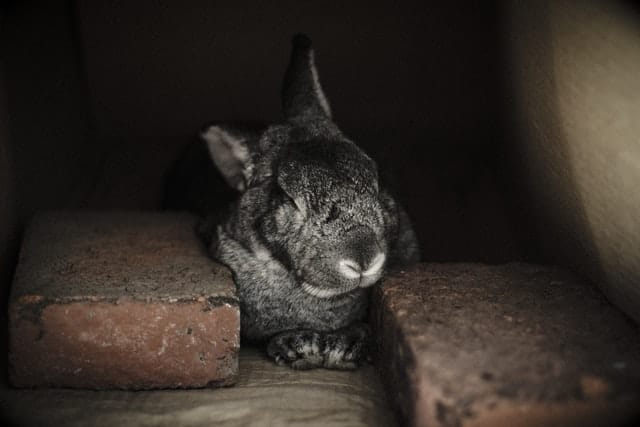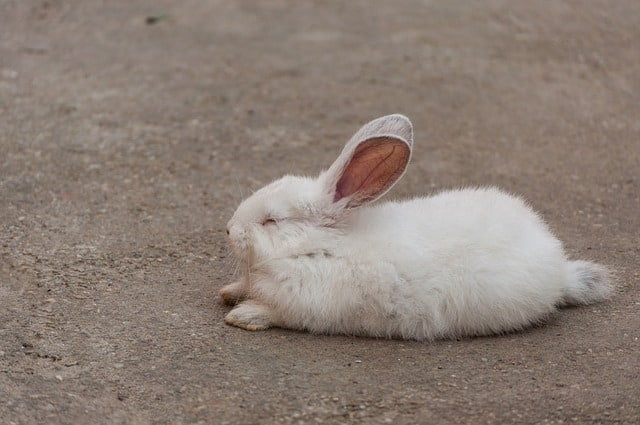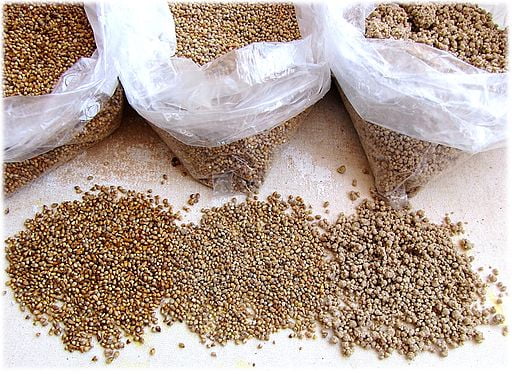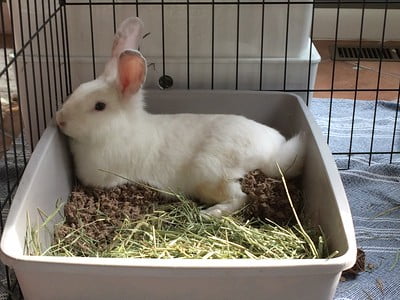Last Updated on March 10, 2023 by Marjon Ramos
The most common reasons why a rabbit would suddenly sleep a lot are pain, temperature, comfort, and age. Rabbits that are in pain would likely hide and rest a lot, because rabbits don’t like showing that they are in pain.
A higher temperature would likely make your rabbits sleep more because moving a lot when it’s hot would only put them at risk of heatstroke.
Age can also be a factor in how much your rabbit sleeps. Older rabbits (> 6 years old) have less energy and will likely sleep more.
Finally, rabbits that are not comfortable in their environment will likely sleep fewer hours than usual. Then they sleep more after they become accustomed to their new environment.
Now that I’ve given you the gist of the article, read on as I explain in more detail why your rabbit is sleeping a lot:
Table of Contents
How do you know if your rabbit is suddenly sleeping more than usual?

To know if your rabbit is sleeping more than usual, you must first know the amount of time rabbits sleep per day so that you have a baseline.
According to a study done by the University of Ottawa, Canada, on average, rabbits sleep 11.4 hours per day.
Most of the 11.4 hours of sleep they get is during the daytime because rabbits are crepuscular, meaning they are most active during dusk and dawn.
The amount of sleep your rabbit gets can also depend on its level of comfort. As an example, rabbits that are living in a new, unfamiliar place would likely be stressed out, which in turn would affect their sleep.
Another factor that would affect your rabbit’s sleep is their age. Older rabbits are more mellow and would likely sleep more.
As you can see, it’s really hard to determine if your rabbit is sleeping more than usual because their sleep can vary a lot.
By observing your rabbit’s sleeping pattern, you can know for sure if your rabbit is sleeping more than usual.
You can also check if your rabbit is sleeping during its active hours (dusk and dawn). If so, your rabbit might be sleeping more than usual.
What causes a rabbit to sleep a lot?

Now that we know that if our rabbit is sleeping more than usual, it’s time to discuss the possible causes of why it happens so that we’ll know what to do.
Here are the following reasons why your rabbit might be sleeping more than usual:
Comfort
Your rabbit’s comfort level can affect their sleep. As an example, if your rabbit is housed near a predator (cats, dogs, etc.), it would likely be stressed out and sleep a lot less.
Another example would be if you just got your rabbit. Newly housed rabbits would likely sleep a lot less because they are not comfortable in your home yet.
Then, after a couple of months, when they’re completely comfortable with you and your home, you might notice that your rabbit is sleeping more than usual.
This is completely normal. So if your rabbit has only been with you for a couple of months and is eating and pooping normally, it is likely fine.
Pain
Rabbits are great at hiding pain because showing it in the wild would only speed up their demise. Rabbits that are in pain will usually just hide and sleep all day.
If you want to know if the cause of your rabbit’s prolonged sleeping pattern is caused by pain, you can look for additional symptoms like:
- Loud teeth grinding.
- Rapid and shallow breathing.
- Lethargy.
- Hunched posture.
- Increased (hair-pulling) or decreased grooming.
- Increased thirst and urination.
- Bulging, strained, staring, or unfocused eyes.
- Reluctance to move.
If you notice that your rabbit is sleeping more than usual or is showing one or more of the symptoms above, immediately take it to a rabbit-savvy veterinarian for proper advice.
Temperature
Since they can’t sweat (except for a few sweat glands in their lips) and pant like dogs, rabbits need to do anything they can to reduce the chance of them developing heatstroke because they are susceptible to it.
Rabbits normally become less active in the summer months when it’s hot. You might notice that your rabbit is less active and sleeps more than usual because moving a lot during the summer months would just make it worse.
The ideal temperature for rabbits is between 55-70 °F (13-21 °C). Depending on the breed, rabbits can tolerate a temperature of about 85 °F (29 °C). Breeds that have thicker wool or fur should be housed at lower temperatures.
Your rabbits are at risk of overheating or heat stroke if the temperature is higher than 85 °F (29 °C). If you live in a humid place (> 85°F), always monitor your rabbit’s temperature because rabbits are prone to heat strokes.
You can test if the reason why your rabbit is sleeping a lot is due to the temperature by touching its ears to see if they’re hot. If it is hot, you should cool your rabbit down by placing a cold water bottle wrapped in a towel near him.
Additionally, you can place some fans near your rabbit to provide some airflow and keep your rabbits in a well-shaded area. You can also let them lick some ice cubes to cool themselves down.
Age
Your rabbit’s age can also be a factor in how much they sleep. Rabbits that are old (> 6 years old) would likely have less energy and would spend most of the day sleeping.
Should you be concerned if your rabbit is sleeping a lot?

If your rabbit is behaving normally, meaning they are eating, pooping, and urinating normally, and you’re not seeing any drastic behavioral changes, the likelihood of them being sick is low.
As I discussed above, your rabbit’s sleep can vary a lot, and it’s really hard to know if they are indeed sleeping more than usual.
When should you bring your rabbit to a veterinarian?
You should bring your rabbit to a veterinarian if you notice additional symptoms like changes in their behavior (ex. not eating), poop, and urine.
Here’s a great video that explains when you should bring your rabbit to a veterinarian:
Conclusion
A rabbit’s sleep patterns can vary a lot. Rabbits that are suddenly sleeping a lot can be caused by pain, temperature, age, and comfort level.
You should take your rabbit to a veterinarian if they are exhibiting additional behaviors such as changes in their eating, urine, or poop habits.
Determining if your rabbit is sleeping more than usual is hard because it can vary a lot, so additional symptoms are the only reliable way to determine if your rabbit needs a veterinarian or not.
Note: make sure that your rabbit is only sleeping a lot and not lethargic. A rabbit that’s experiencing lethargy needs to be checked out by a rabbit-savvy veterinarian because it’s a symptom that something is wrong with your rabbit.
Cite this article:
Related Articles
- What’s the Ideal Temperature For Rabbits?
- How To Tell If A Rabbit Is Sleeping?
- Do Rabbits Dream?
- Do rabbits sleep? What You Need To Know.
- Where Do Rabbits Sleep?
- How Long Do Rabbits Sleep?
- Do Rabbits Sleep With Their Eyes Open?
- Why Is My Rabbit Shaking And Laying Down: 4 reasons (with proven solution)
- How To Tell If A Bunny Is Happy?
- How To Stop Your Rabbit From Licking Their Stitches?
- What To Do If Your Rabbit Won’t Eat After Being Spayed?
Sources
- Environmental heat stress in rabbits: implications and ameliorations
- Sleep—wakefulness rhythms in the rabbit
Image credit – “Knabbel looks like an easter egg.” by jpockele is licensed under CC BY 2.0




